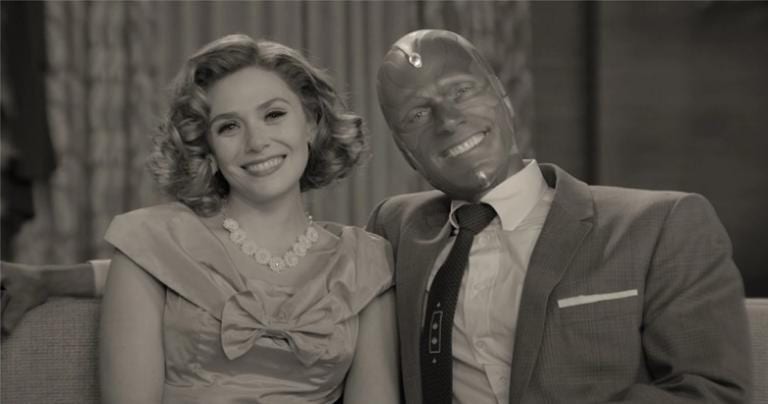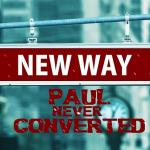
Marvel’s WandaVision, more than just terrific superhero fun, has something deeply spiritual to give viewers.
Last week, WandaVision kicked off Phase Four of the Marvel Cinematic Universe. More than that, it began the next multiphase saga of cinematic entries from the House of Ideas. At two episodes of nine so far streaming on Disney+, it isn’t exactly what fans expected. The slow-paced Wandavision departs forcibly from the action-packed extravaganzas Avengers: Endgame and Spider-man: Far From Home.
Regardless, many Marvelites are rightly thrilled by this new Pleasantville-like entry, the MCU’s first weekly television show. But a few malcontents are disappointed to see what seems to them like a best-of Nick-at-Nite. So far, each episode is like a stroll through the decades of TV-land.
For example, episode one (aptly titled “Filmed Before a Live Studio Audience”) seems to be set in the 1950s (and homages The Dick Van Dyke Show and I Love Lucy). Whereas episode two (“Don’t Touch That Dial”) literally takes you into of 1960s color T.V. (with a kiss of I Dream of Jeannie and Bewitched). As the episodes proceed, one can presume they will continue paying homage to the following decades’ great sitcoms.
Going Deeper with WandaVision
Without a doubt, WandaVision pays deep respect to all these classic shows. However, director Matt Shakman also likely draws inspiration from the mother of all prestige and Peak T.V., Twin Peaks. Season three of that David Lynch/Mark Frost epic is a nostalgia-killer. It continues unrivaled as the best narrative-entertainment running since 2017.
So don’t let appearances fool you into thinking that WandaVision is a comedy or jaunt through old T.V. classics. Like Twin Peaks, WandaVision is really about grief, depression, and loss. It’s also about coping with these in healthy and unhealthy ways. Wanda’s vision is skewed by trauma—everything she loved has been taken from her. This is pretty deep water for superhero stories!
Is Wanda asleep and dreaming this weird adventure? That’s a dangerous prospect because the dreams of someone as powerful as the Scarlet Witch (the other name Wanda goes by, at least in Marvel Comics) can be deadly enough to break the world. Wanda Maximoff (Elizabeth Olsen) is a miracle who can alter reality with nary a thought. Her chaos-magic glows red like the Aether or Reality Stone. Her dreams and nightmares are, therefore, most dangerous.
WandaVision is Power-Packed
MCU head Kevin Feige, perhaps the most significant producer in film history, has declared that Wanda Maximoff is the most powerful Avenger. That makes sense. In Endgame, Wanda almost killed Thanos (Josh Brolin) in single combat. And the Mad Titan knew he was goners, only narrowly escaping death at the cost of reigning fire down on his own forces to stop Wanda. All she had to say was “NO MORE THANOS,” and he’d be toast—that’s how powerful she is. Don’t believe me? Read House of M.
https://www.youtube.com/watch?v=NUDiRL-sc34
So far, WandaVision looks very little like a Marvel production, except for the credits sequence. Wanda settled down. She is married and resides in black-and-white Americana suburban bliss with her synthezoid husband, Vision (Paul Bettany). This is a bizarre marriage, folks! For many reasons, not the least because MCU fans watched Vision die, murdered by Thanos back in Avengers: Infinity War.
Now consider: maybe Wanda has escaped her trauma in WandaVision by dreaming away her problems, altering reality in the process? Perhaps she was tricked into doing so? Could that be what is going on? But if true, that could prove cosmically catastrophic for the Marvel Multiverse. It could even make it descend into madness! For dark forces within and beyond Reality 616, such as the Dread Dormammu, Nightmare, and the diabolical Mephisto, could all swoop in to take advantage of this chaos. Calling Dr. Strange!
Faith & Doubts for WandaVision and More
Fans understandably desire answers to many questions. Wanda’s comic book backstory is majorly complicated. Is the cinematic Wanda a mutant, like the X-Men are? Will she bring the X-Men into the MCU? Will we discover that Wanda is the daughter of the mutant “terrorist” Magneto? And will she ever be called “the Scarlet Witch”? How many of these comic book threads will make their way onto Disney+? Only time will tell, True Believers!
The world we are presented with weekly on WandaVision appears unreal, more so than the pronounced “un-reality” of comic-book superheroes and their exploits. Despite the myriads of MCU fans out there, many find adherence to fantasy troubling or annoying and avoid such fictions.
There are even some who would relegate the Gospels into the same fictional category as superhero comic-books.
Were Early Believers Credulous?
Several contemporary skeptics ridicule the Gospels as authored and populated by credulous ignoramuses who have been conned into buying fairytales. This demonstrates unawareness of the Mediterranean cultural world of Scripture. In a world of B.S. artists where everyone is a BSer, everyone must constantly be on guard against secrecy, lying, and deception. That is the cultural world of the Bible.
Because deception is a perfectly acceptable strategy for maintaining honor—the most essential reality in the Mediterranean cultural world of the Bible—deception is to be expected everywhere, practiced by everyone. Every truth-claim is therefore suspect. In all honor-shame societies, people show off, talk idly, joke around, say empty things, elaborate and exaggerate endlessly, and use pretense, and the biblical world is no different.
Therefore, biblical persons desperately needed to know when others were not engaging in lies and deception! Hence, they ensured truthfulness by placing themselves under the curse of being dishonored or destroyed. These were phrases like, “amen,” “believe me,” “by my life,” and “by my father’s life” (Genesis 21:22—34).
Truth & Lies
Like all other Mediterranean peoples, Biblical people knew that their social world was also part of divine creation. They, therefore, likewise knew it had to be part of Truth. But while their social world was very real and came from Truth, it simultaneously was quite fake, apparent, vain, and fraudulent. This place where Israelites inhaled God’s life was nevertheless also an untrustworthy and unreliable human domain.
All Mediterranean peoples, including the Israelites, understood human life to be a series of contrasts between reality and appearance, what is and what seems, the revealed and the concealed, value and judgment, act and intention. While the Church in later centuries fancied Athenian philosophers with their metaphysics and epistemological views, earlier biblical people knew that only the Highest God knows reality, that which is. In contrast, the only things that human beings can know are appearances, what seems to be (1 Samuel 16:7; Genesis 27:1-41).
For instance, was King Solomon truly wise (1 Kings 3:1-28)? He indeed appeared to be to his fellow human beings, his subjects (1 Kings 3:28). This appearance was strong enough for the Wisdom Tradition to employ Solomon as its grand champion and symbol. But beyond what seems, there was a very different reality to Solomon’s life (1 Kings 11:1-11). What Solomon “revealed” about himself to his subjects was quite different from what he concealed from them.
New Testament Contrast
The difference between the revealed and concealed, the real and the apparent, is also very much a New Testament contrast. Reading Mark 8:27-30, do we see Jesus, the Middle Eastern man, also practicing secrecy and deception? If he does, should we be surprised, given his Mediterranean background and cultural world? Only if we, as Docetists, mistake Jesus for Superman.
When Jesus asks, “Who do people say that I am?”, isn’t that him probing about the kind of “impression” he had crafted for people outside his immediate circle? How would you interpret the various answers his followers give him (v. 28)?
Are any of those honorable answers—John the Baptist, Elijah, or another of the prophets— correct? If not, does Jesus then say, “Hey! We need to correct these people! Give them the orthodox Christological answer!” If he doesn’t (see vv. 29-30), meaning if Jesus is okay with them having wrong but honorable answers about him, what does that say about the Mediterranean Jesus?
How does the episode play out (v. 30)? What does Jesus “hide” and what does Jesus “reveal”? In the story of “Mark,” who gets to know the “real” Jesus? These stories weren’t written by American Catholics, folks!
Deep Spiritual Side of WandaVision
Anyway, beyond appearances and disgruntled, impatient fans, WandaVision is a terrific show, folks. It’s another excellent victory for the most popular film studio around today. But there is more to this show than meets the eye. Ultimately, WandaVision can be viewed in a more profound, spiritual way.
Besides excellent Marvel lava-cake deliciousness, the story of WandaVision reminds me of something the great mystic and Happy Wanderer, Fr. Tony de Mello, once said. Just like Wanda needs to wake up from her dreams and nightmares, so too do we. As Father Tony always reminded his retreatants, spirituality means nothing if not contact with reality and putting on a new mind (Mark 1:15; Matthew 3:2, 4:17; Isaiah 60:1; Ephesians 5:11-14).
The problem is, like Wanda Maximoff, we don’t know that we are sleepwalking through life. We are like those spoiled Marvel fanboys who are giving up at only two episodes because of the dull black-and-white imagery. They’ll be back. Don’t worry. They’ll even re-watch early episodes they trashed later on after realizing the treasures they missed.
WandaVision Mirrors Us
But we who persevere with a T.V. show are in no position to criticize these malcontented viewers. If we are honest, most people do the same with life.
Like Father Tony said,
“Most people, even though they don’t know it, are asleep. They’re born asleep, they live asleep, they marry in their sleep, they breed children in their sleep, and they die in their sleep without ever waking up.”
How true. And we go to Church asleep, also (John 5:25, 28; 8:51; 11:25-26; Revelation 3:1). We are sleeping churches shepherded by sleeping bishops.
And when someone tries to wake us up, we are like Wanda, who tells the S.W.O.R.D. beekeeper, “NO!”
https://www.youtube.com/watch?v=ONJqF8bECc4&t=6s
















